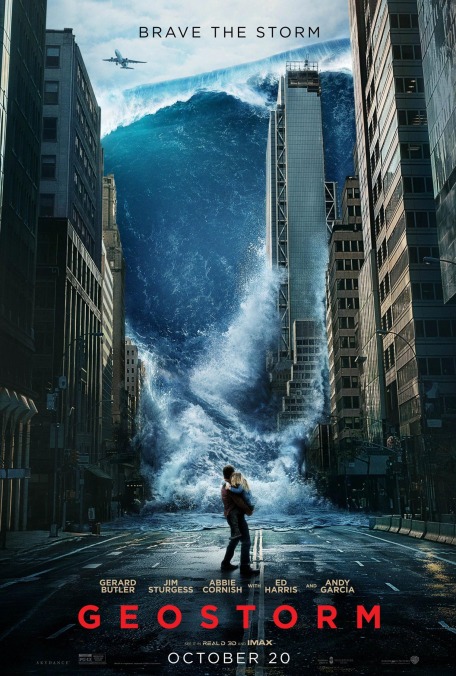The ridiculous Geostorm gives new meaning to the term "disaster movie"

In the tradition of KFC’s Famous Bowl—famously described by Patton Oswalt as “a failure pile”—comes Geostorm, which attempts to be every possible apocalyptic weather-based disaster movie at once. Set just a few years from now, it imagines that the world’s nations have collaborated to build a vast system of satellites that somehow prevent the most catastrophic effects of climate change. Unfortunately, the system gets hacked, and the satellites are turned against humanity, creating weather events far more extreme than anything Mother Nature can concoct. A sudden heat wave causes underground Hong Kong gas mains to explode, sending cars skyward on fireballs. Tsunamis of cold literally turn beachgoers into ice statues, frozen in mid-stride as they flee. People are crushed by enormous boulders of hail. And these are just isolated incidents—unless someone regains control of the satellite system, its attacks will eventually trigger a chain reaction, leading to a global “geostorm” that could wipe out much of the human race.
Usually, the characters in this sort of environmental disaster movie—think The Day After Tomorrow, 2012, The Impossible, San Andreas—are concerned solely with surviving. Geostorm, however, features man-made weather disasters so over the top that they might as well have been devised by a comic-book supervillain, and thus requires a corresponding hero. That would be the otherwise tediously ordinary Jake Lawson (Gerard Butler), who headed the international team that designed the satellite system, popularly known as Dutchboy (after the fable about the kid who plugs a hole in a dike with his finger). At the beginning of the movie, Jake gets fired from the project by his younger brother, Max (Jim Sturgess), after mouthing off to a senator. But once folks start getting roasted and popsicled, the U.S. president (Andy García) and his secretary of state (Ed Harris) task Max with persuading Jake to visit the International Space Station and see if he can figure out what’s gone wrong. Meanwhile, back on Earth, Max, with the assistance of Secret Service agent Sarah Wilson (Abbie Cornish), to whom he’s secretly engaged, begins to investigate the alarming possibility that someone high up in the U.S. government may be behind all of the mayhem.
Having written both Independence Day and its sequel, Dean Devlin—here directing his first theatrical feature, after two decades collaborating with Roland Emmerich—isn’t exactly known for his commitment to narrative logic. With Geostorm, though, he’s really created a dilemma for himself. On the one hand, he wants to fashion a race-the-clock action thriller, and even goes so far as to place a hokey “TIME UNTIL GEOSTORM” countdown on the big screen at NASA headquarters, steadily ticking toward 00:00:00. On the other hand, he has to serve up the mass destruction that everyone came to see. (Armageddon had the same problem, solved via a shower of smaller meteors preceding the big one that Bruce Willis and company head out to blow up.) The result is a series of what can only be called pre-geostorms, which kill so many digital extras in such spectacular fashion that Jake and Max’s efforts to prevent the geostorm itself seem like too little too late. It’s hard to get invested in a routine car chase after seeing the entire city of Dubai swallowed by a tsunami, or dozens of Hong Kong skyscrapers topple like a row of dominos.
For most people, 15 minutes worth of impressive annihilation won’t be worth enduring an hour and a half of dramatic monotony. Butler sleepwalks through his thinly written role, and the ostensible tension between the two brothers, flaring up whenever the energy starts to sag, never feels like anything but a bald contrivance. Likewise, a late scene in which Jake appears ready to sacrifice himself for the good of humanity—which Devlin works hard to sell as a genuine possibility—is preemptively undermined by Jake’s having promised his young daughter (Talitha Bateman) that he would safely return. Geostorm makes a point of showing audiences that a cute dog survives; it’s not gonna have the hero break a promise to his kid by committing noble suicide. The sole point of human interest in the movie is Zazie Beetz as a tech wizard who helps Max search satellite data. It’s a stock role, but Beetz plays it as if she’s still on Atlanta, providing (improvising?) a dose of brazen wit and personality that’s otherwise sorely lacking. She and the special-effects team are the only ones who make it out of this long-delayed failure pile intact.